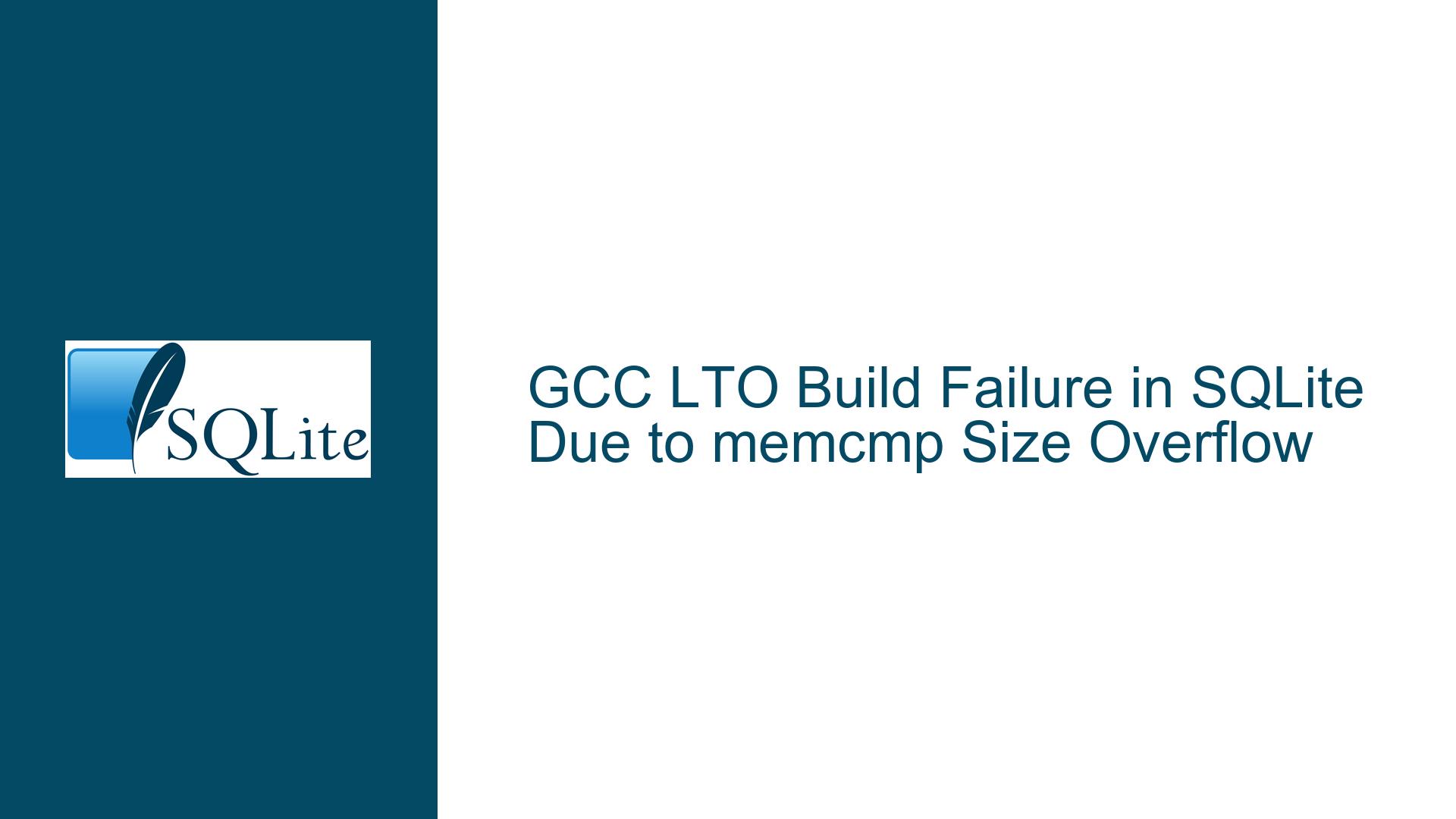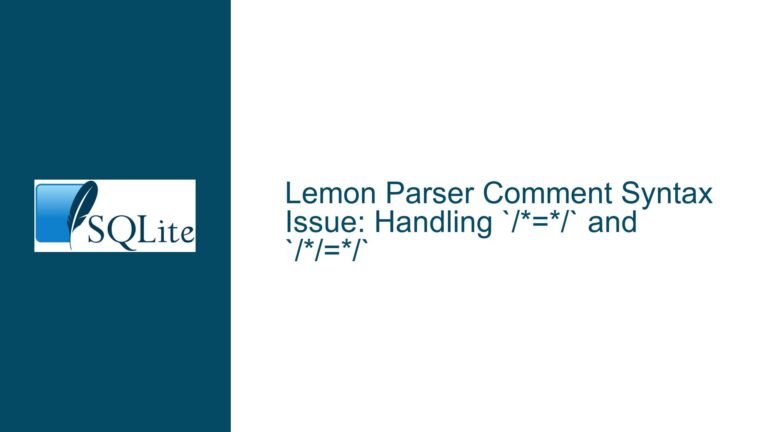GCC LTO Build Failure in SQLite Due to memcmp Size Overflow
GCC LTO Compilation Error with memcmp Size Overflow
When attempting to build SQLite version 3.34.0 using GCC with Link-Time Optimization (LTO) enabled, a compilation error occurs. The error message indicates that the memcmp function is being called with a size argument that exceeds the maximum allowable object size. Specifically, the error message reads:
../sqlite/sqlite3.c: In function ‘vdbeSorterCompareText’:
../sqlite/sqlite3.c:95150:9: error: ‘memcmp’ specified size 18446744073709551609 exceeds maximum object size 9223372036854775807 [-Werror=stringop-overflow=]
95150 | res = memcmp(v1, v2, (MIN(n1, n2) - 13)/2);
| ^
lto1: all warnings being treated as errors
lto-wrapper: fatal error: /usr/bin/cc returned 1 exit status
compilation terminated.
/usr/bin/ld: error: lto-wrapper failed
The error is triggered in the vdbeSorterCompareText function, where memcmp is used to compare two memory regions. The size argument for memcmp is calculated as (MIN(n1, n2) - 13)/2, where n1 and n2 are derived from variable-length integers stored in memory buffers. The GCC compiler, with LTO enabled, appears to misinterpret the size calculation, leading to a false positive warning that is treated as an error due to the -Werror flag.
This issue is particularly problematic because it prevents the successful compilation of SQLite when LTO is enabled, even though the code logic is sound and the size calculation should never result in an invalid value at runtime. The error seems to be related to GCC’s inlining and optimization behavior during the LTO phase, where it attempts to precompute values that are inherently runtime-dependent.
GCC Inlining and LTO Misinterpretation of Runtime-Dependent Values
The root cause of this issue lies in the interaction between GCC’s LTO optimization and the runtime-dependent nature of the memcmp size argument. The memcmp function is used to compare two memory regions, and the size of these regions is determined by the values of n1 and n2, which are derived from variable-length integers stored in memory buffers. These values are not known at compile time and can only be determined during execution.
However, when LTO is enabled, GCC attempts to optimize the code by inlining functions and precomputing values where possible. In this case, GCC seems to incorrectly assume that MIN(n1, n2) could be zero, leading to a negative value when subtracted by 13. This negative value, when divided by 2, results in a very large unsigned value due to integer overflow, which triggers the -Wstringop-overflow warning. Since this warning is treated as an error due to the -Werror flag, the build fails.
This behavior is exacerbated by the fact that GCC’s LTO phase is not able to fully understand the constraints of the runtime values. The n1 and n2 values are derived from variable-length integers, which are guaranteed to be within a certain range, but GCC’s LTO optimization does not take this into account. As a result, it generates a false positive warning, assuming that the size argument to memcmp could be invalid.
Furthermore, this issue is not limited to the vdbeSorterCompareText function. Similar warnings have been observed in other parts of the SQLite codebase, such as the zipfileComparePath function in the zipfile.c extension. In this case, GCC generates a warning about the size argument to memcmp, even though the logic of the function ensures that the size argument is always valid.
Disabling LTO and Investigating GCC Optimization Behavior
To address this issue, the most immediate solution is to disable LTO when building SQLite with GCC. This can be done by removing the -flto flag from the compiler options. Disabling LTO prevents GCC from performing the aggressive inlining and optimization that leads to the false positive warning. While this may result in slightly less optimized code, it allows the build to complete successfully without errors.
However, disabling LTO is not a long-term solution, especially for those who rely on LTO for performance improvements. For those who need to use LTO, there are several steps that can be taken to investigate and potentially resolve the issue:
Analyze GCC Optimization Behavior: Use GCC’s optimization and debugging flags to gain more insight into how the compiler is interpreting the code. Flags such as
-fdump-tree-allcan be used to generate detailed intermediate representations of the code, which can help identify where the incorrect assumptions are being made.Modify the Code to Avoid False Positives: In some cases, it may be possible to modify the code to make it more explicit to the compiler that certain conditions cannot occur. For example, adding assertions or additional checks that ensure
n1andn2are within valid ranges before callingmemcmpcan help GCC understand that the size argument is always valid.Use Compiler-Specific Pragmas: GCC provides pragmas that can be used to control optimization behavior for specific sections of code. For example, the
#pragma GCC optimizedirective can be used to disable specific optimizations for the problematic function, preventing the false positive warning from being generated.Report the Issue to GCC Developers: If the issue is determined to be a bug in GCC, it should be reported to the GCC development team. Providing a minimal reproducible example and detailed information about the optimization behavior can help the developers identify and fix the issue in future releases.
Consider Alternative Compilers: If the issue persists and cannot be resolved, it may be worth considering alternative compilers that do not exhibit the same behavior. For example, Clang is another popular compiler that supports LTO and may handle the code differently.
In conclusion, the GCC LTO build failure in SQLite due to the memcmp size overflow warning is a complex issue that arises from the interaction between GCC’s optimization behavior and the runtime-dependent nature of the code. While disabling LTO provides an immediate workaround, further investigation and potential code modifications are necessary to fully resolve the issue and allow for the use of LTO without triggering false positive warnings.






